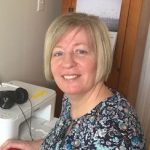In June, CERIC released the Recovery Pulse Survey with the aim of learning more about how COVID-19 was affecting career services in Canada. Nearly 1,150 career professionals from across the country responded. The results revealed a remarkable resilience and innovation from career professionals as they have reimagined their work. However, it also highlighted challenges for organizations and client groups.
To shed more light on the experiences of career professionals working in different areas of the sector during COVID-19, Ben Liadsky, Pulse Survey research analyst and Program Manager at The Counselling Foundation of Canada, reached out to survey participants to hear about how their work has been affected by the pandemic, their advice for their peers and more.
This interview with Moragh Ferguson-MacDonald of Nova Scotia Works is the fourth and final in the CareerWise series of Recovery Pulse Survey. Other interviews in this series:
- How Employment Services Manager Carter Hammett is navigating COVID-19
- How Career Advisor Marina Hai is navigating COVID-19
- How Experiential Learning Co-ordinator Dan Walters is navigating COVID-19
Can you tell me a bit about where you work?

My community has about 6,000 people, we’re a close community. When some of the larger employers have left the area in recent years, it had a ripple effect and made it difficult for people to find work. We also find there are less options for full time employment. A lot of our clients fall into the category of older workers. We find particular barriers fall around computer navigation, access to technology and low literacy skills within our client base. This can become challenging as our society changes into a more digital one.
Can you tell me a bit about yourself?
I’ve been working with our organization for 13 years and have held a few different roles. My current position is Job Developer/Employment Support Practitioner. In my role, I work with people facing market perception barriers to navigate the labour market and fulfil their employment goals.
I love working within the community and helping others. It’s a smaller community so it’s nice to be able to both help directly as well as help others to give back through finding employment; it’s reciprocating full circle. It’s been a great experience working with people who have disabilities in particular and a rich learning experience.
How has COVID affected your organization?
It was a hard learning curve in the beginning. We had to stop in-person appointments and transition to fully virtual services. We’ve only recently began going back to the office, but it’s a staggered process and we rotate in and out of office. We have been able to start in person services by appointment only.
I think we did a very good job at transitioning to virtual services. It was nice to see more broadly how all of the Nova Scotia Works across the province came together to support one another. As an organization, we got better at using social media (which was something that was new for me) and continued to share resources with clients about job opportunities and how to manage their well-being.
One of the things we’ve been able to do is to have a virtual Coffee House for people with disabilities to come together, chat, network and for us to be able to share resources. We do this in partnership with the YMCA of Cape Breton, Horizon Achievement Centre and Pathways to Employment. We had one in-person Coffee House at the beginning of March, which went well and then COVID happened so we decided to try it virtually.
We had our first virtual edition in early July using Zoom and it went great. We had discussions about how COVID has affected our employment as well as first voice experience with disability and how some employers aren’t open to hiring people with disabilities. Other participants shared their stories and it was phenomenal to listen and learn from these folks.
How has COVID affected how you work?
I’ve used this time to take some online classes. I completed one on peer support training and I’m in the process of completing another on supporting people with autism. I really like doing virtual classroom learning. It’s also a way for me to speak from experience to my clients to empathize and show that it’s possible to accomplish different things in a virtual environment. Similarly, it’s helping me to better engage employers on how they can hire and support persons with disabilities and leverage the adaptability employers have had to have navigating this unprecedented time.
I’m usually a very social person and love getting out into the community and volunteering. I found it difficult to have to be at home so I’m looking forward to more things hopefully opening up again soon.
What is something that has surprised you during these past few months?
I was surprised at how we could operate virtually and be successful in that.
What have you learned from your clients about what they need most right now?
I’ve learned that my role should really be about assisting rather than doing things for people. I think there’s a fine balance around how much hand holding to do. It’s clear to me that going forward, there will be a need for people to be even more independent and COVID has only helped to illustrate that. Previously, someone who might not be particularly tech savvy might come into the office and need help with their resume and it would be easy for me to make changes on the computer, but we need to focus more on equipping people to be able to make changes like these themselves. While also recognizing the learning difficulties in our community and how to better prioritize our services.
I’m also a mental health champion, so it was difficult to hear from clients on how they were struggling with their mental health. People didn’t have the same kind of access to resources. Groups like NA [Narcotics Anonymous] or AA [Alcoholics Anonymous] weren’t available because of social distancing. Those people were really suffering. To have the virtual coffee house was really helpful from this point of view and allowed participants to connect with one another. It was helpful for them to be able to release what was on their mind and to have the support of other people listening to them. Hopefully, until we open up more, virtual networking will continue to be helpful.
What advice would you give to others in the field based on your experience regarding how to work differently?
Try to get people to be more independent because this is the way it’s going to be. Things are going to be more and more virtual so helping people navigate this is going to be crucial.
You can learn more about Moragh and her work at Nova Scotia Works by reading this recent article.







